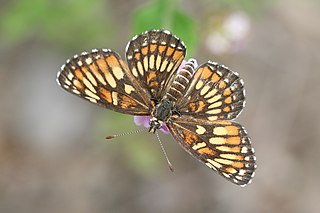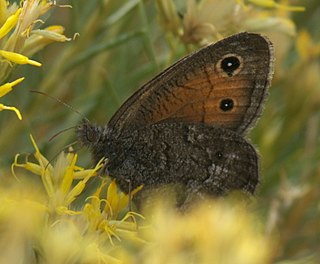
Skippers are a group of butterflies placed in the family Hesperiidae within the order Lepidoptera. They were previously placed in a separate superfamily, Hesperioidea; however, the most recent taxonomy places the family in the superfamily Papilionoidea, the butterflies. They are named for their quick, darting flight habits. Most have their antenna tips modified into narrow, hook-like projections. Moreover, skippers mostly have an absence of wing-coupling structure available in most moths. More than 3500 species of skippers are recognized, and they occur worldwide, but with the greatest diversity in the Neotropical regions of Central and South America.

Erynnis is a genus in the skippers butterfly family Hesperiidae, known as the duskywings. Erynnis is found in the Neotropical realm and across the Palearctic, but the highest species diversity is in the Nearctic. The genus was erected by Franz von Paula Schrank in 1801.

Trypoxylon collinum is a species of square-headed wasp in the family Crabronidae. It is found in North America. It nests inside hollow tubes.

Erynnis telemachus, the Rocky Mountain duskywing, is a species of spread-wing skipper in the butterfly family Hesperiidae. It is found in North America.
Coenus is a genus of stink bugs in the family Pentatomidae. There are at least three described species in Coenus.

Manda is a genus of spiny-legged rove beetles in the family Staphylinidae. There are at least two described species in Manda.

Dicosmoecinae is a subfamily of northern caddisflies in the family Limnephilidae. There are about 19 genera and at least 80 described species in Dicosmoecinae.
Gonodonta bidens is a species of fruit-piercing moth in the family Erebidae. It is found in North America.

Speyeria nokomis, the nokomis fritillary, is a species of fritillary in the family of butterflies known as Nymphalidae. It is found in North America.
Agathymus mariae, the lechuguilla giant skipper, is a species of giant skipper in the family of butterflies known as Hesperiidae. Other common names include Mary's giant skipper and five-spot skipper. It was first described by William Barnes and Foster Hendrickson Benjamin in 1924 and it is found in Central and North America.

Erynnis tristis, commonly known as the mournful duskywing, is a species of spread-wing skipper in the butterfly family Hesperiidae. It is found in Central America, North America, and South America. It is mottled brown with a white fringe on the hind wings. It appears similar to the funereal duskywing, but the mournful duskywing is more likely to appear in urban areas. The larva feeds on young oaks while adults nectar from a variety of wild and garden flowers.

Chlosyne theona, the theona checkerspot, is a species checkerspots in the butterfly family Nymphalidae found in North America. The MONA or Hodges number for C. theona is 4508.

Zarhipis is a genus of glowworm beetles in the family Phengodidae. There are at least three described species in Zarhipis, all restricted to the western regions of North America.

Euphilotes bernardino, the Bernardino blue, is a butterfly in the family Lycaenidae. The species was first described by William Barnes and James Halliday McDunnough in 1916. It is found in North America.

Apodemia mejicanus, the Mexican metalmark or Sonoran metalmark, is a species of butterfly in the family Riodinidae. It was first described by Hans Hermann Behr in 1865. It is found in North America.

Historis odius, the orion cecropian, is a species of crescents, checkerspots, anglewings, etc. in the butterfly family Nymphalidae.

Cercyonis meadii, or Mead's wood nymph, is a species of brush-footed butterfly in the family Nymphalidae. It was first described by William Henry Edwards in 1872 and it is found in North America.

Lethe appalachia, known generally as the Appalachian brown or Appalachian eyed brown, is a species of brush-footed butterfly in the family Nymphalidae. It is found in North America.

Codatractus arizonensis, the Arizona skipper, is a species of dicot skipper in the family of butterflies known as Hesperiidae. It is found in Central America and North America.
Neonympha helicta, the helicta satyr, is a species of brush-footed butterfly in the family Nymphalidae. It is found in North America. There is some question that this putative species is the same as that figured by Jacob Hübner as Oreas helicta
















